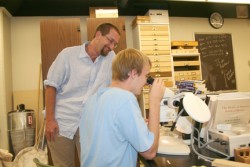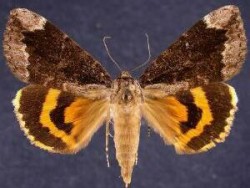 Andrew Johnson, third-year student and Keith Summerville, professor of environmental science and policy, identify animal sample from Indiana forest through microscope. |
Although the research sites are located south of Indianapolis, Ind., Drake students are participating in a 10-year study of sustainable forestry in Indiana hardwood ecosystems right here on campus, to help improve the way lumber is harvested.
“This is an exciting collaboration,” said Keith Summerville, assistant professor of environmental science and policy (ENSP). “If we can figure out a way to reduce the amount of timber taken out of forests and protect the species — that is the perfect balance.”
Drake is among 24 partners working on this research project including Purdue University, Ball State University, Indiana State University, the Indiana State Department of Natural Resources (DNR) and the Nature Conservancy. Summerville will attend a joint meeting in October with Purdue, the Nature Conservancy and the Indiana DNR to discuss progress and project details, and hopes to take a student with him to a bigger meeting in Indianapolis, Ind. next April.
While Drake students are focusing on forest Lepidoptera, the study of moths and butterflies, the other partners are looking at various plants and animals. All animal samples and fieldwork is being conducted at the Morgan-Monroe State Forest and Yellowwood State Forest in Indiana. The research partners will share data and write a collaborative paper on the research study, Summerville said.
In May, Summerville and third-year ENSP student, Miranda Dupont from Tuscon, Ariz., traveled to the research sites to build traps and lay out sampling plots. While on site, Dupont and Summerville were able to use global positioning systems (GPS) to orienteer steep oak-hickory forests with limestone gorges.
Summerville was awarded grants of $31,100 from the Indiana Nature Conservancy and $8,718 from Purdue University. Both grants are for the same forestry project and will cover funding for three years of moth and butterfly research.
 An underwing moth called “The Bethrothed” (Catocala innubens), is common to the state forest research sites. |
The first year of the study consists of animal sampling and data collecting. Trees will be cut the second year, and animal samples won’t be collected again until the third year when the impact of forestry can be seen.
Robb Krehbiel, a first-year ENSP student from McPherson, Kan., and third-year ENSP student, Andrew Johnson from Palos Verdes, Calif., are also working on the project with Summerville in the lab, processing and identifying the samples of moths and butterflies. Their research will continue into the 2007-08 academic year. Approximately 500 species and 15,000 individual varieties of moths and butterflies have been collected at the research sites this summer.
“While time in the classroom is certainly valuable, my collaboration with this project has helped prepare me for a career in field ecology better than any book,” Dupont said. “I feel confident entering a rigorous study abroad program for ecology, and a competitive job market knowing that I have this experience under my belt.”
The project provides Drake students the opportunity to work one-on-one with Summerville, gain research experience and enhance professional development. Students also get the opportunity to meet and work with professionals from the Army Corp of Engineers, the Nature Conservancy and Purdue University, Dupont said.
Krehbiel says this project is important for the University and students at Drake. “This project may not seem to relate to all students, but they should be proud to know that they’re attending a University that is taking steps needed to strike the balance between consumption and conservation,” Krehbiel said. “It’s also important that students begin to realize how their actions impact the world around them.”
The preliminary findings will help researchers find ways to improve forestry that will also protect the wildlife and plant life in the forest. Results will also offer insight into the big picture of how forestry can change the environment in the forest.
“We’re looking at changes in the landscape, plants and the food chain, and trying to see if there are indirect changes. For example, a loss of trees means a loss of moths, which would lead to a loss of birds,” Summerville said. “We’re looking at the bigger picture of the cascade of changes that can occur with forestry.”

